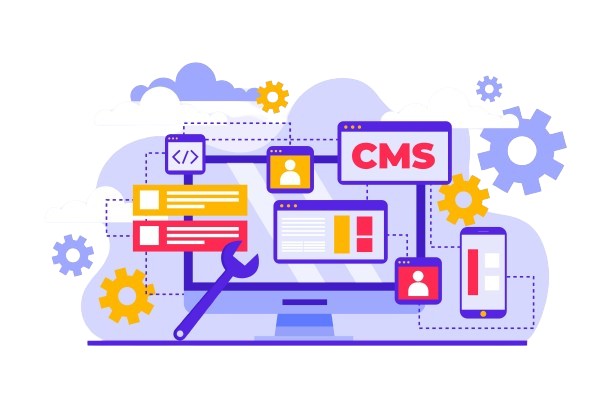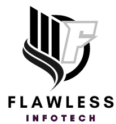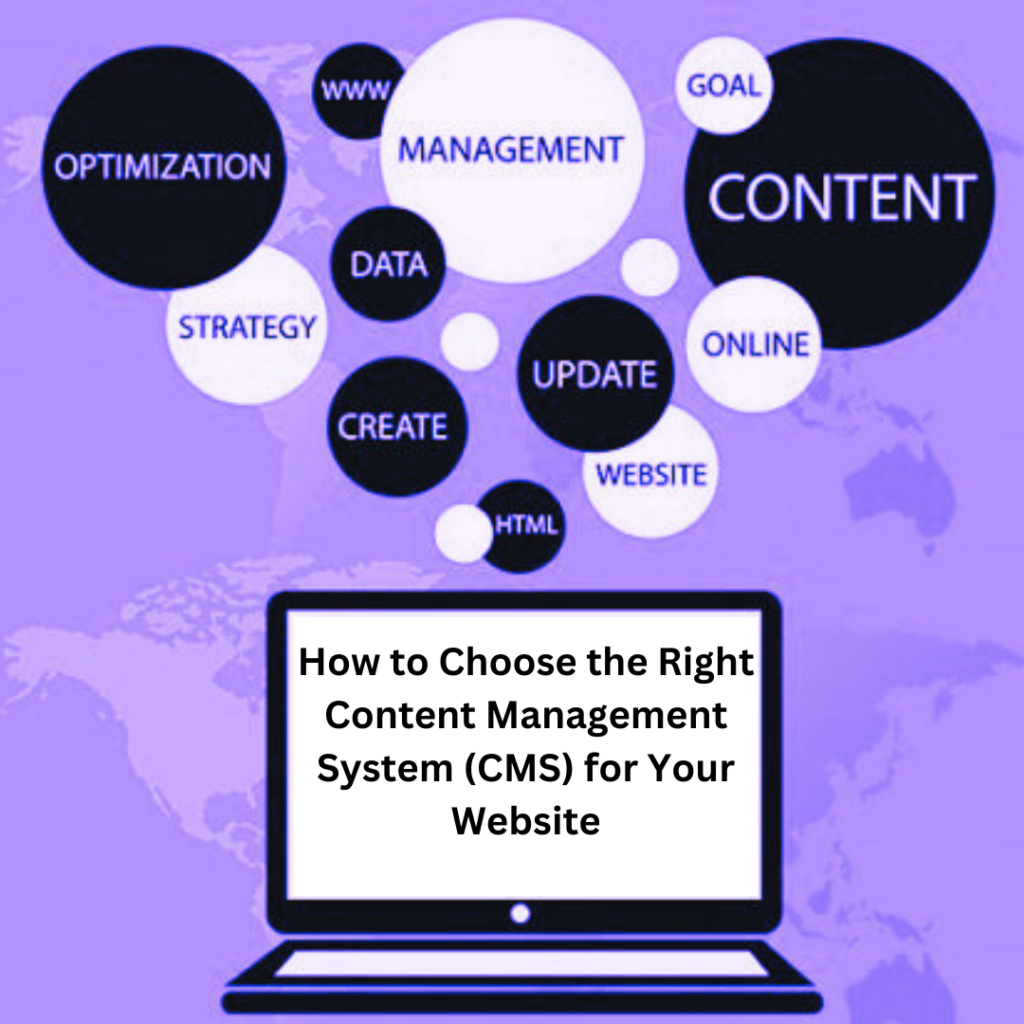Introduction
For your website to succeed, selecting the best CMS is essential. With numerous options available, selecting the most suitable one can be difficult. However, by understanding your requirements, evaluating features, and considering scalability, you can make an informed decision. You will gain valuable knowledge and advice from this in-depth guide on choosing the ideal customizable software for your website.
What is a Content Management System?
A Content Management System is a software application that allows users to create, manage, and modify digital content without requiring specialized technical knowledge. It provides a user-friendly interface for managing website content, including text, images, videos, and more.

Importance of Choosing the Right CMS
Choosing the right software is paramount for the success and sustainability of any website. This serves as the backbone of your digital presence, influencing everything from user experience to search engine visibility. Here’s why selecting the appropriate customizable software is crucial:-
- User Experience
The CMS you choose directly impacts the experience of both website administrators and visitors. A user-friendly website makes it easier to create, edit, and manage content, resulting in a smoother workflow and better user engagement.
- Customization & SEO Friendly
Choosing a CMS with robust customization options enables tailoring your website’s design and functionality to match your brand, while an SEO-friendly they will optimize content and structure to enhance visibility and attract organic traffic, essential for online success in a competitive digital landscape.
- Security & Community Support
Selecting a CMS with strong security features safeguards your website against cyber threats, while ample community support provides access to resources, documentation, and expertise, ensuring prompt assistance and guidance for smooth operation and troubleshooting in managing your online presence.
- Cost-Effectiveness
While some options may come with initial costs or subscription fees, choosing the right one can ultimately save you money in the long run. Consider factors such as licensing fees, hosting costs, maintenance expenses, and potential ROI when evaluating the overall cost-effectiveness of a CMS.
Key Factors to Consider
- Scalability and Flexibility
Choose a content management system that can grow with your website and meet its changing needs. Look for a platform that allows easy integration of additional features and functionalities as your website expands.
- User-Friendly Interface
Choose a CMS with an intuitive and user-friendly interface to simplify content management tasks. A straightforward dashboard and editing tools empower you to update your website efficiently without extensive technical knowledge.
- Customization Options
Evaluate the customization options offered by different CMS platforms. Select one that enables you to personalize your website according to your branding guidelines and specific needs. Customizable templates and themes are advantageous for creating a unique online presence.
- SEO Capabilities
Prioritize a CMS that offers robust SEO functionality, including customizable URLs, meta tags, and XML sitemaps. Enhanced SEO features help improve your website’s visibility and rankings on search engine results pages (SERPs).
- Security Features
Ensure prioritizes security with features such as SSL encryption, regular updates, and strong password protocols. A secure system protects your website and sensitive information from potential cyber threats and data breaches.
- Support and Community
Consider the level of support and community resources available for the platform. Opt for a system with responsive customer support and an active community forum where you can seek assistance, share experiences, and troubleshoot issues effectively.
- Cost and Budget
Evaluate the cost implications of different options, including initial setup fees, ongoing maintenance costs, and scalability expenses. Choose a solution that fits your budget while offering the necessary features and scalability for your website.
- Mobile Responsiveness
Ensure the CMS prioritizes mobile responsiveness to deliver an optimal user experience across various devices. A mobile-friendly website is essential for reaching a broader audience and improving engagement.
- Future Growth and Expansion
When choosing a CMS, take into account the future development and expansion requirements of your website. Select a platform that will grow with your company and be able to easily integrate new features and advancements in the future.
Popular CMS Options
There are several options available, each with its own strengths and weaknesses. Here are some of the most popular choices:
- WordPress
WordPress is the most popular CMS globally, powering over 40% of all websites on the internet. It offers a user-friendly interface, a vast plugin library, and a robust community of developers and users.
- Joomla
Joomla is a flexible and extensible CMS that is suitable for a wide range of websites, from simple blogs to complex e-commerce platforms. It offers robust features and functionality but has a steeper learning curve compared to WordPress.
- Drupal
Drupal is a powerful and secure CMS that is ideal for large-scale websites with complex requirements. It offers advanced features and scalability but requires technical expertise to set up and manage effectively.
- Wix
Wix is a beginner-friendly CMS that offers a drag-and-drop interface and a wide range of pre-designed templates. It’s ideal for small businesses and individuals looking to create a simple website quickly.
- Squarespace
Squarespace is a popular choice for designers and creatives, offering beautiful templates and a user-friendly interface. However, it has limited flexibility compared to other options.
Making the Decision
When choosing a customizable software for your website, it’s essential to carefully assess your needs and consider all available options. Here are some tips to help you make the right decision:
- Assess your website's requirements, including design, functionality, and scalability.
- Test and evaluate different platforms to see which one best fits your needs.
- Seek advice from experts and other website owners who have experience with different CMS options.
FAQs
To choose the right customizable software for your website, assess your specific requirements, such as scalability, customization options, SEO capabilities, security features, and budget. Research and compare different platforms based on these criteria to identify the best fit for your needs.
Using a customizable software for website management offers several benefits, including streamlined content publishing, easy website customization, improved SEO performance, enhanced security, and scalability to accommodate business growth. Additionally, a software simplifies collaboration and content editing tasks, saving time and resources.
Yes, it’s possible to switch after launching your website, although the process may involve some complexities such as content migration, URL redirection, and potential SEO implications. Evaluate your reasons for switching different platforms and carefully plan the migration process to minimize disruptions and preserve your website’s functionality and SEO performance.
It’s essential to keep your system updated regularly to ensure optimal performance, security, and compatibility with the latest technologies and standards. Check for updates from its provider and apply them promptly to benefit from new features, bug fixes, and security patches.
Yes, there are several free CMS options available, such as WordPress, Joomla, and Drupal, that offer robust features and functionality without requiring upfront licensing fees. However, keep in mind that while the CMS itself may be free, you may incur costs for hosting, themes, plugins, and additional services.
Conclusion
Choosing the right CMS for your website is a crucial decision that can impact your online presence and success. By carefully evaluating factors such as scalability, flexibility, SEO capabilities, security features, and user experience, you can select a CMS that aligns with your goals and enhances your website’s performance. Remember to consider your specific requirements, conduct thorough research, and seek recommendations from peers or industry experts to make an informed decision. With the right CMS in place, you can efficiently manage your website, engage your audience, and achieve your online objectives. Additionally, for expert assistance in developing your website with SEO, contact Flawless Infotech. We specialize in creating websites that not only meet your needs but also excel in search engine optimization (SEO), ensuring maximum visibility and success.

